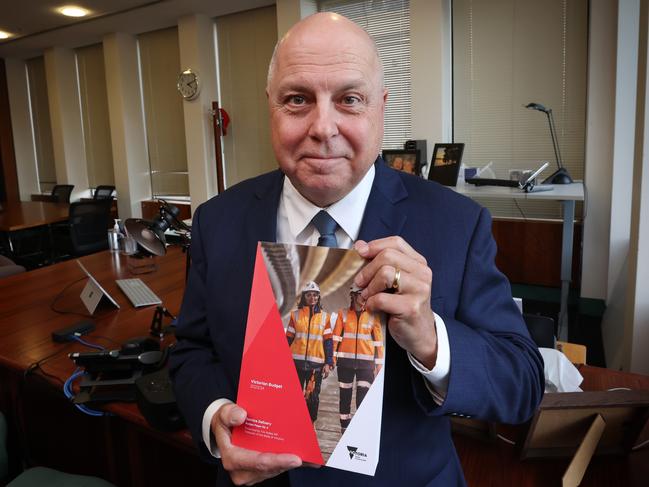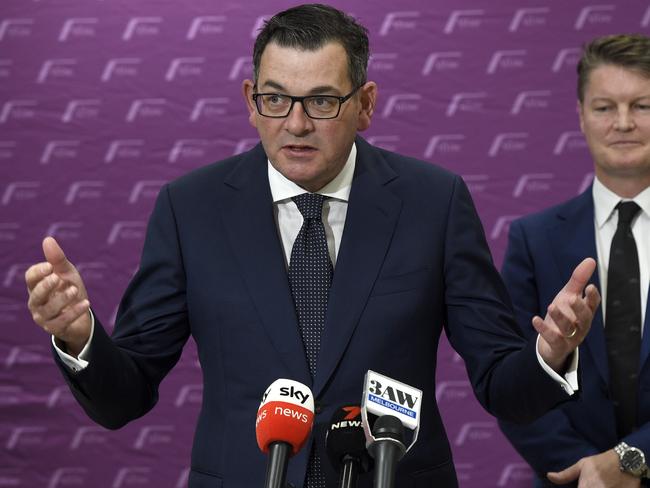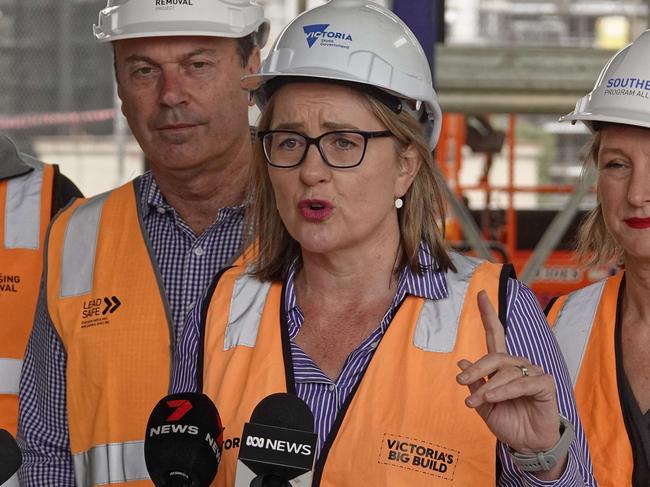Forecasts released ahead of Tuesday’s budget predict Victoria will record an operating surplus of $1bn in 2025-26
A new business tax is set to be a centrepiece of the Covid debt repayment plan as the state government makes a bold prediction on when it will record a surplus.
Victoria
Don't miss out on the headlines from Victoria. Followed categories will be added to My News.
Big business is set to bear the brunt of paying down Victoria’s record debt with a new levy expected to be introduced in Tuesday’s budget.
It comes as the Andrews government plans to keep spending more money than it brings in for at least another year, before returning to a promised operating surplus.
It is understood a new business tax will be a centrepiece of the government’s Covid-19 Debt Repayment Plan which aims to pay down $31.5bn of pandemic borrowings.
The move follows a controversial new tax on thousands of businesses introduced to fund reforms to the state’s mental health system.

Defending the mental health levy at the time, Treasurer Tim Pallas said it was appropriate businesses that benefited during the pandemic made substantial contributions in its wake.
Forecasts ahead of Tuesday’s budget predict Victoria will record an operating surplus of $1bn in 2025-26.
That figure is $100m higher than forecast in last year’s pre-election budget update. The surplus is forecast to grow to $1.2bn by 2026-27.
The bold prediction is to be realised on the back of significant cuts to government programs and the number of public sector employees.
An increase in taxes, fees and charges are also tipped to feature in Mr Pallas’s ninth budget as the government reins in spending and pays down its record debt.
The debt is on track to soar to $165bn by 2025-26 with senior government sources saying that figure is forecast to grow significantly higher.

But it is understood all efforts have been made to keep it below $200bn.
Shadow treasurer Brad Rowswell said net debt was projected to reach $187bn by 2026-27 based on annualised growth forecasts in the pre-election budget update.
The same forecasts expect interest payments to rise to $9.2bn and tax revenue to climb to $37.1bn, up from $31.2bn estimated for 2022-23.
“It it’s big business that pays, or it’s small business that pays, Victorians pay, that’s how it works,” Mr Rowswell said.
“(The) budget will show that under Labor, Victoria is broke.”
Opposition finance spokeswoman Jess Wilson said three key components desperately needed to be addressed in the budget, calling for better financial management of Big Build projects, relief of housing pressures and more support for small business.
“Unfortunately there is no case for optimism in the budget,” she said.
“This is going to be a brutal budget … Under Labor, Victorians are being punished for this government’s incompetence.”
The government has already announced businesses face a 42 per cent hike in WorkCover premiums, making the scheme one of the most expensive in the country.
Thousands of public service jobs are expected to be cut, funding to community groups and government programs slashed and infrastructure spending to take a hit.
Major projects including Melbourne Airport Rail have been paused, with the budget to reveal the true scale of cost blowouts and timing delays.
Deputy Premier Jacinta Allan on Monday dodged questions about new taxes, but suggested families would not be affected. However, she refused to rule out new or increased taxes such as changes to registration or licensing fees.
“This will not be something that will be affecting hardworking Victorian families,” she said.
But she doubled down on blaming the Reserve Bank for Victoria’s debt saying it was “taken on because of the urging of the RBA”.

It came after economists shot down the government’s claims that the budget emergency could be blamed on RBA governor Philip Lowe.
AMP chief economist Shane Oliver said Victoria’s finances were not the same as those of homeowners caught out by interest rate hikes.
But Ms Allan said the government was “simply stating the facts” because both the commonwealth and the RBA urged the states to spend to get through the pandemic.
“Governments around the country joined together through forums like national cabinet where there was the obligation put forward to support communities, families and businesses through this unprecedented of times,” she said.
“We have come through that time but there is still the task before us to look at how we bring down that investment that was made during that Covid period.”
Already Victoria is paying $10m in interest payments a day, while Victorians are paying more per person in tax than any other state in Australia.
In 2021-22, Victorians paid an average of $5638 to the state government and local councils compared to $5537 in NSW.
The total collected by state and local government was $36.9bn, up from $29.6bn the year before – a staggering 24.6 per cent increase.
The Cassar family are doing it tough after listening to the Reserve Bank about interest rates. After monthly mortgage repayments for his home spiked $600 a month, Aintree father Luke Cassar now battles to keep his family warm.
“Every dollar you spend really counts,” he said, adding he was worried about the state’s debt and what it would mean for his son, Mason.
“I would be very worried if my son had to help with paying back the debt because with inflation going up and house prices rising he wouldn’t be able to get anywhere in life or earn a good living,” he said.
“We have already had to make many cuts to be able to afford things so it would be unfair for our kids to suffer.”
More Coverage
Read related topics:Daniel Andrews





